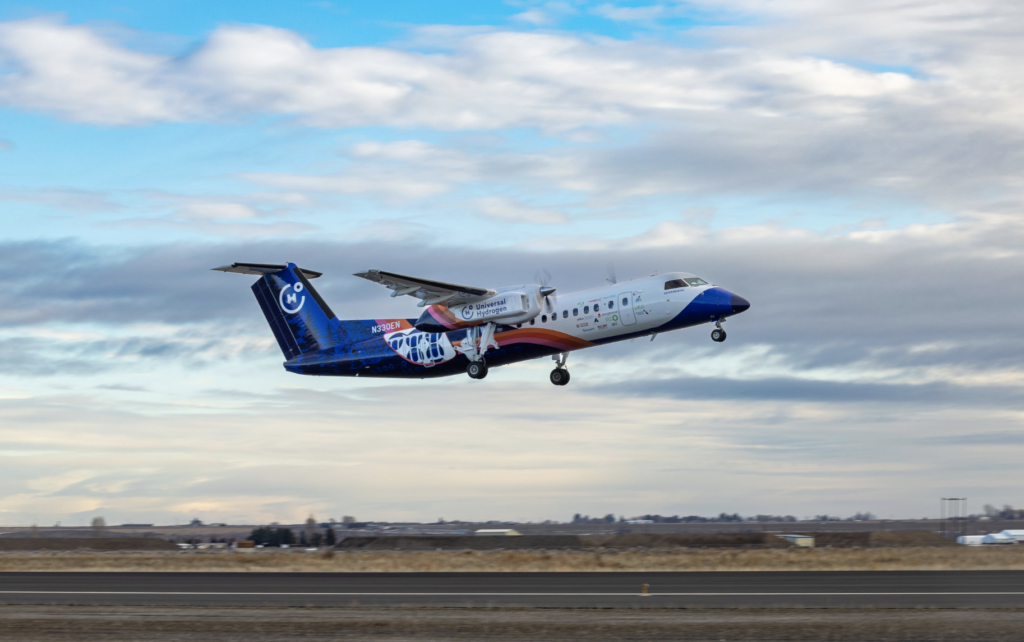
Universal Hydrogen Co. flew a 40-passenger regional airliner using hydrogen fuel cell propulsion during a demonstration in early March. (Photo: Business Wire)
Recently, Universal Hydrogen and Hartzell Propeller showed significant progress toward hydrogen fuel cell-powered flight. The two companies collaborated to alter a De Havilland Dash 8 testbed, allowing it to be powered by both hydrogen fuel cells and traditional aviation fuel. With a successful first flight on March 2, 2023, the two companies’ collaboration has made promising steps toward making air travel cleaner and more sustainable.
Headquartered in the Los Angeles area, Universal Hydrogen has a mission to decarbonize the aviation industry while keeping flying affordable for passengers and operators. While it was founded in early 2020, the company has already reached some impressive milestones—namely the first flight of its partly hydrogen fuel cell-powered testbed aircraft earlier this month. The flight, which lasted for approximately 15 minutes, used hydrogen fuel cell propulsion and demonstrated the viability of clean fuel sources in the industry.
While this flight was operated under an FAA Special Airworthiness Certificate, the company hopes that the testing stage will last two years and that its new technology could enter into commercial service as early as 2025 with launch customers Connect Airlines and Amelia. Universal Hydrogen’s recent success has inspired confidence across the industry, as the company already has an order book for 247 aircraft conversions from 16 customers in different regions of the world.
The success of the Dash 8 testbed’s first flight was largely thanks to technology developed by Hartzell Propeller. As a part of Hartzell Aviation, Hartzell Propeller designs and manufactures propellers for aircraft in a variety of industry segments. Developed by Hartzell, the five-bladed propeller provided to support the testbed (dubbed “Lightning McClean” by Universal Hydrogen) has a 91-inch diameter and is made of carbon fiber. While it is smaller than the standard propeller that a Dash 8 is equipped with, it successfully provided the thrust necessary to keep the aircraft airborne after the jet fuel-powered engine was throttled back.
“During the second circuit over the airport, we were comfortable with the performance of the hydrogen powertrain, so we were able to throttle back the fossil fuel turbine engine to demonstrate cruise principally on hydrogen power,” remarked Alex Kroll, a former U.S. Air Force test pilot and the company’s chief test pilot. “The airplane handled beautifully, and the noise and vibrations from the fuel cell powertrain are significantly lower than from the conventional turbine engine.”
Hartzell Propeller is involved in several projects that aim to decarbonize the aviation industry, making this partnership just one of many of its attempts to make flying cleaner. As Hartzell Propeller President JJ Frigge explained, “This project with Universal Hydrogen is one of many programs where Hartzell Propeller is working with and supporting advanced air mobility manufacturers. Hartzell Propeller has been around for over a hundred years, and carbon-free flight can power our next century.”
In addition to providing the propeller, Hartzell also designed a customized governor for Universal Hydrogen. This device, which automatically changes the propeller blade pitch of an aircraft, helps the engine maintain a consistent RPM.
This first flight marks a significant milestone in the industry-wide attempt to make flying cleaner and more sustainable. It featured the largest hydrogen fuel cell-powered aircraft, as well as the largest aircraft to cruise primarily on hydrogen. If all goes according to Universal Hydrogen’s plan, the first ATR 72 to run solely on hydrogen using its technology could be in passenger service by 2025.